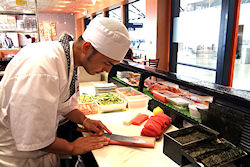Detroit Metro Earns Top Honors for Healthy Concessions
Airport food used to be simple: Hot dogs spun endlessly on heated rollers, and almost everything else was deep-fried and served in a cardboard boat. Prepackaged, processed fare was easy for concessionaires, but hard on travelers' arteries and waistlines.
These days, healthier options such as veggie stir fry, grilled fish and fresh salad are growing faster than organic strawberries in July. According to the Physicians Committee for Responsible Medicine (PCRM), 79% of restaurants at the 14 largest U.S. airports currently offer at least one healthy option.
 "Greasy airport food is often as big a pain for travelers as long lines or baggage fees," says Dr. Susan Levin, director of nutrition education for PCRM. "Low-fat, high-fiber vegetarian meals can help prevent many common health problems, and healthy eating can even make passengers feel less frazzled."
"Greasy airport food is often as big a pain for travelers as long lines or baggage fees," says Dr. Susan Levin, director of nutrition education for PCRM. "Low-fat, high-fiber vegetarian meals can help prevent many common health problems, and healthy eating can even make passengers feel less frazzled."
Much to the delight of health-conscious travelers everywhere, airports are sprinkling such options throughout their food courts and terminals.
|
|
Docs Like Detroit
Last year, Detroit Metropolitan Wayne County became the first airport to earn a perfect score in PCRM's annual survey. Nutritionists found at least one low-fat, cholesterol-free vegetarian entrée at every restaurant in the airport.
Particular standouts include Sora Japanese Cuisine & Sushi Bar, Mediterranean Grill and Ruby Tuesday's full salad bar.
Adding still more healthy food options, however, is not the battle cry of the Wayne County Airport Authority.
"Our focus is on variety," explains public affairs manager Scott Wintner. "Healthy is just one of the culinary interests we try to satisfy, along with vegan, kosher, international and many others."
|
Airport |
Score |
Healthful*/Total Restaurants |
| 1. Detroit Metropolitan Wayne County Airport | 100% | 54/54 |
| 2. San Francisco International Airport | 94% | 60/64 |
| 3. Phoenix Sky Harbor International Airport | 87% | 54/62 |
| 4. Houston George Bush Intercontinental Airport | 86% | 49/57 |
| 5. Newark Liberty International Airport | 85% | 58/68 |
| 6. (tie) Minneapolis-St. Paul International Airport | 83% | 50/60 |
| 6. (tie) Orlando International Airport | 83% | 39/47 |
| 7. (tie) Denver International Airport | 80% | 45/56 |
| 7. (tie) Los Angeles International Airport | 80% | 45/56 |
| 8. Dallas/Fort Worth International Airport | 77% | 75/97 |
| 9. Hartsfield-Jackson Atlanta International Airport | 76% | 65/86 |
| 10. Miami International Airport | 72% | 28/39 |
|
* Restaurants offering at least one low-fat, cholesterol-free vegetarian entrée |
||
Heart Smart & Business Smart
In May, Detroit Metro renewed its commitment to healthy food and beverage options by continuing its 2004 partnership with the Heart and Vascular Institute of the Henry Ford Hospital. Dieticians from Henry Ford will again evaluate concessionaires' menus and award the hospital's HeartSmart® designation to items that qualify on multiple nutritional fronts - total fat, saturated fat, trans fat, cholesterol and sodium content.
Last time, nearly 50 side dishes and main entrées qualified on all fronts, and an additional 25 met fat and cholesterol guidelines but exceeded recommended sodium levels.
 "Lots of airport restaurants now offer soups, salads, fruit cups and low-fat yogurt parfaits," reports Darlene Zimmerman, a registered dietician at Henry Ford. "Even places you might not expect to have healthy items, like Taco Bell and Popeye's Louisiana Kitchen, had a few options qualify."
"Lots of airport restaurants now offer soups, salads, fruit cups and low-fat yogurt parfaits," reports Darlene Zimmerman, a registered dietician at Henry Ford. "Even places you might not expect to have healthy items, like Taco Bell and Popeye's Louisiana Kitchen, had a few options qualify."
As in 2004, the airport is picking up the tab for the service. This year, it's expected to cost about $350 for each concessionaire that chooses to participate. According to Zimmerman, roughly 40 restaurants are undergoing reviews this year vs. about 15 in 2004.
 Sushi was a particularly healthful addition to Detroit Metro's concessions mix. |
"It's a popular program with individual concessionaires," explains Wintner. "Many consider it another way to respond to customers' interest in healthier menu items. They see the market value of it."
With ample HeartSmart® emblems appearing on its menu after the initial review, Mediterranean Grill quickly made a name for itself with health-conscious travelers and airport employees alike. Midfield Concession Enterprises, new to the airport at the time, brought the Middle Eastern concept to the airport's table for the debut of the McNamara Terminal in 2002.
"The impetus to create a healthier eating environment came from the airport authority," recalls Midfield's general manager, Ric Frievalt. "Mediterranean Grill was perfect with its emphasis on fresh style cooking and an absence of fat and preservatives. People were beginning to ask for food made to order, not processed or frozen for who knows how long."
|
|
According to Wintner, the more diverse mix of concessions assembled for McNamara Terminal not only influenced what appeared on visitors' plates, but also how much it cost and the customer service that accompanied it. Increased competition from independent companies and vendors from Delaware North, Concessions International, Midfield Concession and HMSHost created an entirely new dynamic, he explains.
 With nine food and beverage outlets in McNamara Terminal and nine in North Terminal, Midfield's stable includes health-oriented restaurants like Mediterranean Grill as well as brands such as Mrs. Fields Cookies and Cheeburger, Cheeburger.
With nine food and beverage outlets in McNamara Terminal and nine in North Terminal, Midfield's stable includes health-oriented restaurants like Mediterranean Grill as well as brands such as Mrs. Fields Cookies and Cheeburger, Cheeburger.
"People are making the choice to order healthier items," reports Frievalt. "We haven't had to remove any of our HeartSmart® selections due to lack of sales or customer interest. They're performing well.
"We see a good mix in sales between healthy and other menu items," he continues. "The key is that more healthy options are now available if passengers want them."
 At the Counter
At the Counter
Midfield provides specific training about serving health-conscious customers to its concessionaires' employees.
"We encourage staff to use the HeartSmart® system and to let customers know that we can modify other items for them," notes Frievalt.
The value of having healthy items on the menu, he relates, is not a tough sell. "Companies are adapting to what customers want," he explains. "Even franchised restaurants are interested in developing recipes that are healthier or modifying existing items to meet physicians' guidelines for healthy eating."
On an airport-wide basis, Detroit Metro's interest in offering healthy concessions hasn't turned french fries into contraband. A sandwich shop, for instance, recently replaced a TCBY yogurt stand.
"We're not looking to become a health food joint," explains Wintner. "Sometimes, even the healthiest travelers just want a Big Mac, and we make sure they can get it. We're not cramming healthy food down anyone's throat; we're evolving with the market. Customers want healthy options, so that's what we offer."
|
Gelato Maker Targets Airport Market Travelers looking for a sweet treat that doesn't ruin their diet will be in luck if Paciugo Gelato & Caffé has its way. With 43 streetside stores, the company is preparing for takeoff in airports throughout the United States.
That's just where Paciugo hopes to fit in, with signature flavors like Amarena Black Cherry Swirl, Fondente (chocolate) and Pannacotta (Italian wedding cake). Because its gelato is made with milk rather than cream, it has almost 70% less fat than premium ice creams, explains Albright. Many of Paciugo's fruit-based sorbets are fat-free. After studying the airport sector for two to three years, the company is expecting to open its first airport location at Cleveland Hopkins International in September or October. "We've been approved and are negotiating the sublease of space," reports Albright. "We're also on track to go into Atlanta - the airport authority is just deciding where to put us - and we're preparing a bid for IAH in Houston." Securing a location at George Bush Intercontinental would be a "big coup" for the Dallas-based company, he notes. In total, the company is working on deals with about a dozen U.S. airports. "Some are in very preliminary stages," Albright qualifies, "and others are close to bearing fruit." The company's ability to fit stores into small, oddly configured spaces has proved to be a distinct advantage. Even though each location makes its own gelato and sorbet on site, the ideal store footprint requires only 300 to 350 square feet. "Good frontage is important because of our display case," specifies Albright. "When it's filled with 30 to 40 different flavors, it's arresting. The sight of it makes passengers break stride." The company also leverages taste as a competitive tool. "Our chocolate comes from Belgium, our Aramena (candied) cherries come from Italy and our pistachios come from Sicily," chronicles Albright. "We buy our fruit fresh from the farmers' market in Dallas and freeze it to send to our stores. The closest thing to a preservative we use is lemon juice."
The company showcased its products' taste in May by distributing about 1,200 free samples at the American Association of Airport Executives conference in Dallas. "The reception we got was amazing," reports Albright. "We're working really hard to learn the nuances of doing business in airports." Part of Paciugo's strategy is partnering with MBC Concessions, an established entity in the airport business with connections to minority-owned companies and prime contractors. Lucian Dillingham, president/CEO of MBC, considers Paciugo "the most exciting frozen dessert concepts" he has seen in years. Not all of Paciugo's airport locations, however, will be developed with MBC. "We're learning the benefits of being part of larger bid by a consultant or prime contractor," he explains. The company is also adjusting its traditional store model to the all-hours operation of airport environments. "We're beefing up our morning offerings with more fresh-squeezed juices, free-trade Arabica coffee and pastries to go," says Albright. "Ultimately, they're changes we can share with our other locations to help build their business, too." |
FREE Whitepaper
Fairbanks International Airport Baggage Transport Conveyor Enhanced With Mod Drive™ System
Airports face a host of unique industry challenges, such as meeting efficiency regulations and seeking out the best maintenance practices to reduce costs and keep operations flowing. In today’s current economic climate, any potential cost savings can go a long way.
In 2019, Alaska’s Fairbanks International Airport (FAI) sought to modernize its equipment and operations. They were dissatisfied with the performance of the gearmotors on their baggage transport conveyors and began searching for new suppliers. Regal approached FAI with a solution that could improve equipment performance and simplify maintenance, with the added benefit of energy cost savings: the Hub City® MOD Drive™ system.
This white paper discusses the hardware deployed, the test results and the annualized expectations for ROI.


 "The food choices in airports these days are light-years ahead of what they used to be," says Keith Albright, senior vice president of franchising for Paciugo (pronounced Pah-choo-go). "Travelers want more than greasy hamburgers, and airports are responding with fresher, healthier, hipper food choices."
"The food choices in airports these days are light-years ahead of what they used to be," says Keith Albright, senior vice president of franchising for Paciugo (pronounced Pah-choo-go). "Travelers want more than greasy hamburgers, and airports are responding with fresher, healthier, hipper food choices."








